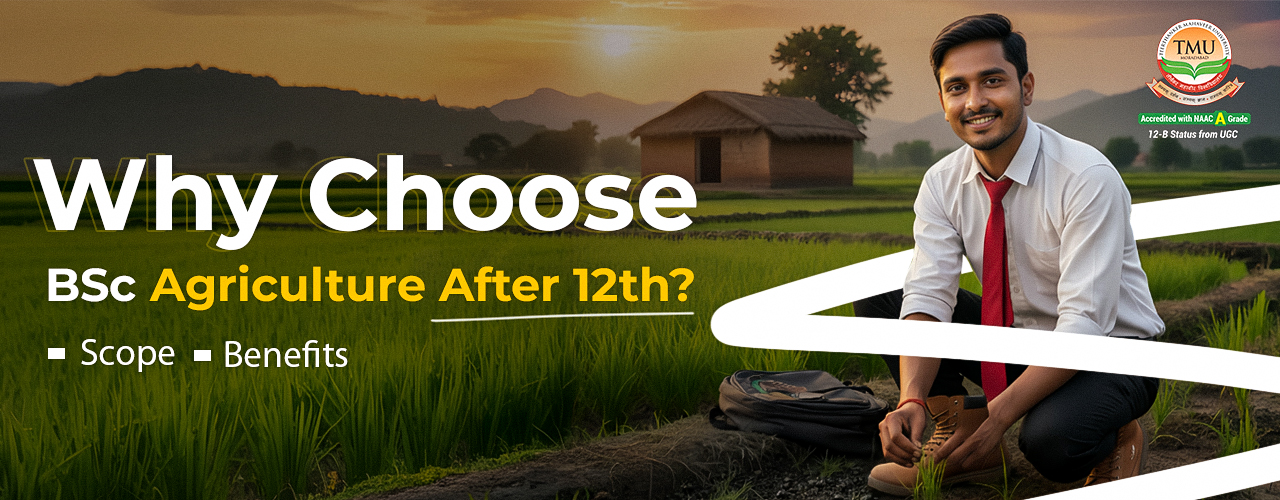Why Choose BSc Agriculture After 12th? Scope and Benefits
Table of Contents
Agriculture has always been the backbone of India’s economy. With nearly 60% of the population depending on farming directly or indirectly, careers in this field remain crucial.
After completing 12th grade, many students wonder which professional course provides a blend of science, technology, and real-world application.
BSc Agriculture is one such course that not only ensures a promising career but also contributes to the development of society.
In this article, we’ll explore why choosing BSc Agriculture after 12th is a wise decision, its scope, benefits, job opportunities, salary potential, and much more.
What is BSc Agriculture?
BSc Agriculture is a four-year undergraduate degree program that focuses on the study of agriculture and related sciences. This course covers areas like crop production, soil science, animal husbandry, agricultural engineering, biotechnology, economics, and sustainable farming practices. It aims to prepare students with both theoretical knowledge and practical skills to improve agricultural productivity and sustainability. Unlike traditional courses, BSc Agriculture gives students hands-on training through practicals, field visits, research projects, and internships.
Agriculture is not just about farming; it’s about applying science and technology to improve food production, conserve natural resources, and support the growing population. Choosing this course after 12th can open doors to multiple opportunities, including government jobs, private sector careers, entrepreneurship, and even higher studies like MSc and PhD.
In simple words, BSc Agriculture is a career path that helps you build a strong future while contributing to the nation’s most important sector—food and farming.
Teerthanker Mahaveer University
Apply for Admission
Click Here To Apply for Admission
Importance of Agriculture in India and the World
Agriculture is often called the backbone of India’s economy. More than 50% of India’s population depends on agriculture for their livelihood, and it contributes a significant percentage to the GDP. Not only in India but globally too, agriculture plays a crucial role in ensuring food security and fighting hunger.
With an increasing population, the demand for food and raw materials is rising rapidly. Modern agriculture is no longer just about ploughing fields—it involves advanced technologies like drones, AI-driven farming equipment, hydroponics, and genetically improved seeds. This creates a huge demand for skilled professionals who understand both traditional and modern agricultural practices.
By choosing agriculture as a career, students don’t just build their own future but also help in solving global challenges like food scarcity, climate change, and sustainable farming. This makes BSc Agriculture one of the most valuable courses for young students after 12th.
Why Consider BSc Agriculture After 12th?
Rising Demand for Skilled Professionals
One of the main reasons to consider a BSc Agriculture after 12th is the increasing demand for trained professionals in the agriculture sector. Unlike before, today’s farming industry is not limited to just manual labour. It requires people who understand crop management, irrigation systems, soil fertility, pest control, and even agribusiness management.
With the growth of technology, modern farming techniques are being adopted worldwide. From precision farming and greenhouse cultivation to organic farming and food processing, every field needs skilled graduates. BSc Agriculture graduates are trained to handle these new challenges and contribute to the industry.
Additionally, government and private companies are launching multiple projects to boost agricultural productivity. This has created new job opportunities in sectors like food processing, biotechnology, fertiliser industries, seed companies, and agricultural machinery firms.
Agriculture as the Backbone of the Economy
Agriculture has always been the foundation of India’s economy. Even with the rise of industries and IT, agriculture continues to employ the largest workforce in the country. Choosing BSc Agriculture after 12th gives students a chance to be part of this vital sector and contribute directly to national development.
The agricultural sector is not only about growing food but also about supporting allied industries like dairy, fisheries, poultry, and forestry. With globalisation, there is also a growing demand for Indian agricultural products in international markets. Graduates in this field can play a key role in increasing exports and strengthening the economy.
For students who want a career that combines stability, respect, and opportunities to make a difference, agriculture is one of the best choices after 12th grade.
Eligibility and the Admission Process
Subjects Required in 12th
To pursue a BSc Agriculture, students must have completed their 12th with Science subjects. Most universities require Physics, Chemistry, and Biology (PCB) as compulsory subjects, while some also accept students with Mathematics along with Biology. A minimum of 50% marks in 12th is usually required, though the percentage may vary from one college to another.
Agriculture is a science-based field, so having a background in biology and chemistry helps students understand subjects like plant pathology, soil science, and genetics better. However, students with a mathematics background can also benefit when it comes to agricultural engineering and agribusiness.
Entrance Exams and Admission Criteria
Admission to BSc Agriculture is usually done through entrance exams conducted at the national, state, or university level. Some of the popular entrance exams include
- ICAR AIEEA (All India Entrance Examination for Admission)
- State-level entrance exams like MHT CET, KEAM, KCET, AP EAMCET, etc.
- University-specific exams conducted by agricultural universities
Based on their exam scores, students are shortlisted for counselling and admissions. Some private universities also offer direct admission based on 12th marks.
Getting admission into a good agricultural university can give students an edge because they get better exposure, training, and placement opportunities.
Course Structure of BSc Agriculture
Duration of the Course
BSc Agriculture is a four-year undergraduate course, divided into eight semesters. Each semester includes both theoretical subjects and practical training. The course is designed to provide students with a comprehensive understanding of agriculture, from soil management to advanced farming technologies.
Subjects and Topics Covered
The BSc Agriculture curriculum is quite broad, covering multiple fields. Some of the major subjects include:
- Agronomy (crop production and management)
- Soil Science
- Plant Breeding and Genetics
- Entomology (study of insects and pest control)
- Horticulture (fruits, vegetables, and floriculture)
- Animal Husbandry
- Agricultural Economics
- Plant Pathology
- Agricultural Engineering
- Food Technology
- Agribusiness Management
This wide range of subjects ensures that students don’t just specialise in farming but also gain knowledge of related industries and technologies.
Practical Learning and Research Opportunities
One of the best parts of this course is the emphasis on practical training. Students get to participate in:
- Fieldwork and farm training
- Research projects in laboratories
- Internships with agricultural firms
- Visits to agricultural industries and farms
This real-world exposure helps students apply their classroom knowledge to actual farming and agribusiness situations, making them job-ready from the beginning.
Scope of BSc Agriculture in India and Abroad
Government Job Opportunities
BSc in Agriculture opens up a wide range of government jobs in sectors like agriculture, forestry, food processing, irrigation, and research. Graduates can work as agricultural officers, horticulture officers, or food safety inspectors or join state and central government departments.
Private Sector Jobs
In the private sector, opportunities are growing in companies that deal with fertilizers, pesticides, seeds, food processing, and agri-tech startups. Students can also join banks as agricultural field officers or work in export firms handling agricultural products.
Higher Education and Research Options
Students who want to continue their studies can pursue an MSc in Agriculture in specialised fields like Plant Breeding, Agronomy, Soil Science, or Agricultural Biotechnology. There are also opportunities for research at national and international universities.
Benefits of Pursuing a BSc Agriculture
Career Stability and Job Security
One of the biggest advantages of choosing BSc Agriculture after 12th is career stability. Unlike some fields where job opportunities fluctuate based on market trends, agriculture will always be relevant because food is a basic necessity. As long as people need food, skilled professionals in agriculture will be in demand.
Government jobs for agriculture graduates are especially stable, with benefits like a pension, job security, and career growth. Even in the private sector, agribusinesses and food companies require specialists who can handle production, processing, and management.
Another aspect of job security in agriculture is the wide variety of roles available. A graduate can work as an agricultural officer, research scientist, farm manager, food inspector, or even start their own business. This flexibility gives students confidence that they won’t be stuck with limited options.
Contribution to Food Security and Sustainability
Choosing agriculture as a career isn’t just about personal growth—it’s also about serving society. With the global population increasing rapidly, food production needs to double in the coming decades. Climate change, soil degradation, and limited water resources make this a huge challenge.
Graduates of BSc Agriculture play a vital role in developing sustainable farming techniques. They help improve crop yields, promote organic farming, reduce the use of harmful chemicals, and protect biodiversity. In this way, agriculture professionals contribute directly to food security and environmental conservation.
For students who want a meaningful career where they can make a difference, agriculture provides the perfect opportunity.
Opportunities in Entrepreneurship and Agribusiness
A BSc in Agriculture doesn’t limit students to jobs; it also opens doors for entrepreneurship. Many graduates start their farms, nurseries, organic stores, or agri-tech startups. With government schemes promoting entrepreneurship in agriculture, young professionals get access to loans, training, and subsidies.
For example, agribusinesses like food processing units, dairy farms, poultry farms, and greenhouse cultivation are in high demand. Graduates with strong business ideas and knowledge can build successful enterprises, not just for themselves but also by creating jobs for others.
In short, agriculture isn’t just about working for someone else—it’s also about becoming your own boss and contributing to the economy.
Salary and Career Growth
Average Salary Packages
The salary after completing a BSc in Agriculture depends on the type of job and organisation. Fresh graduates in government jobs like agricultural officer or horticulture inspector can earn between ₹3.5 lakh to ₹6 lakh per year. In private companies, salaries usually start around ₹2.5 lakh to ₹5 lakh per year but increase with experience and skills.
For those who pursue higher studies (like MSc or MBA in Agri-Business), salary packages can go much higher, often reaching ₹8 lakh to ₹12 lakh per year in reputed companies. International opportunities can bring even better pay, especially in countries with advanced farming practices.
Future Growth in the Agricultural Sector
The agricultural sector is expanding rapidly with modern technologies like drones, artificial intelligence, precision farming, and hydroponics. These innovations require trained professionals to manage and implement them. As a result, career growth in agriculture is faster than ever before.
Graduates who keep updating their skills and specialize in fields like biotechnology, agribusiness, or food processing will always stay ahead in the job market. Moreover, with India becoming a major exporter of agricultural products, the scope for career growth is endless.
Top Colleges for BSc Agriculture in India
| College/University | Type | Location | Key Highlights |
| Indian Agricultural Research Institute (IARI) | Government | New Delhi | Premier research institute in India; ICAR-affiliated; strong focus on research and innovation. |
| Tamil Nadu Agricultural University (TNAU) | Government | Coimbatore, Tamil Nadu | One of the oldest and top-ranked agri universities; offers wide specializations. |
| Punjab Agricultural University (PAU) | Government | Ludhiana, Punjab | Known for Green Revolution contributions; excellent research facilities. |
| Acharya N.G. Ranga Agricultural University (ANGRAU) | Government | Guntur, Andhra Pradesh | Offers practical training; strong linkages with agricultural extension services. |
| Govind Ballabh Pant University of Agriculture and Technology (GBPUAT) | Government | Pantnagar, Uttarakhand | India’s first agricultural university; known as the “Harvard of Agriculture in India.” |
| Banaras Hindu University (BHU) – Institute of Agricultural Sciences | Government | Varanasi, Uttar Pradesh | Offers both BSc and MSc Agriculture; excellent faculty and research support. |
| University of Agricultural Sciences (UAS) | Government | Bangalore, Karnataka | Renowned for modern agricultural studies; focus on agribusiness. |
| Teerthanker Mahaveer University (TMU) | Private | Moradabad, Uttar Pradesh | Offers BSc (Hons) Agriculture; modern teaching methods; practical field training. |
| Lovely Professional University (LPU) | Private | Jalandhar, Punjab | Offers BSc (Hons) Agriculture; international tie-ups; good placements. |
| SRM University | Private | Chennai, Tamil Nadu | Provides specialization in agribusiness and agri-tech; modern labs. |
Skills Required for BSc Agriculture Students
Scientific Knowledge and Research Skills
Since agriculture is based on science, students must have strong knowledge of biology, chemistry, and environmental sciences. Critical thinking and problem-solving are essential for research in crop improvement, pest control, and soil management.
Students also need practical skills to conduct experiments, analyse data, and apply scientific methods to real-life farming challenges.
Business and Management Skills
With agribusiness growing rapidly, students should also develop skills in finance, marketing, and management. Understanding supply chains, export-import regulations, and food processing industries can give graduates an edge in the job market.
Soft skills like communication, teamwork, and leadership are equally important since agriculture often involves working with farmers, businesses, and government agencies.
Challenges in the Agriculture Sector
Climate Change and Technological Needs
One of the biggest challenges in agriculture today is climate change. Unpredictable rainfall, rising temperatures, and natural disasters affect crop productivity. Farmers and agricultural professionals need innovative solutions to adapt to these changes.
Another challenge is the lack of awareness about modern technology among rural farmers. While advanced tools exist, they are not always accessible or affordable. BSc Agriculture graduates can bridge this gap by educating farmers and helping them adopt sustainable practices.
Solutions Through Innovation
To overcome challenges, agriculture needs continuous research and innovation. Methods like vertical farming, hydroponics, organic farming, and genetically modified crops can help boost production.
Agriculture graduates are the ones who will lead these changes, combining traditional knowledge with modern science to create sustainable solutions for the future.
Future of Agriculture as a Career
Role of Technology in Agriculture
Agriculture today is not the same as it was a few decades ago. With the integration of technology, farming has transformed into a highly advanced and data-driven industry. Modern techniques like drone monitoring, satellite mapping, and smart irrigation systems are making farming more efficient. Precision farming, for instance, allows farmers to use the right amount of water, fertiliser, and pesticides, reducing waste and increasing yield.
BSc Agriculture graduates play a vital role in this technological revolution. They are trained not only in traditional farming methods but also in scientific and digital tools. Their knowledge of biotechnology, soil health, crop genetics, and modern machinery ensures that farming keeps up with global demands.
The future of agriculture will heavily rely on innovations like vertical farming, hydroponics, and automation. As countries invest more in food technology and sustainability, agriculture graduates will have endless opportunities to lead this change.
Global Opportunities for Agricultural Graduates
Agriculture is not limited to India—it’s a global sector with a growing demand for skilled professionals. Developed countries such as the USA, Canada, and Australia hire agricultural experts for roles in food processing, research, and sustainable farming. Many international organizations like the Food and Agriculture Organization (FAO), World Bank, and global NGOs also recruit agriculture graduates for development projects.
Students who pursue higher studies abroad after BSc Agriculture often land high-paying jobs with international exposure. This global demand ensures that agriculture is one of the few careers that can take you places—literally.
Tips for Students Choosing BSc Agriculture
How to Prepare for Entrance Exams
To secure admission in top agricultural universities, preparation for entrance exams is crucial. Students should focus on strengthening their basics in Physics, Chemistry, and Biology. Regular practice of previous years’ question papers and mock tests can help improve speed and accuracy.
Additionally, staying updated with current affairs related to agriculture, government policies, and environmental issues can be useful for exams that include general knowledge sections. A disciplined study routine and time management are key to scoring well.
Building Skills Beyond Academics
While academics are important, BSc Agriculture students should also work on building extra skills that make them industry-ready. These include:
- Computer Skills: Knowledge of data analysis software and digital tools used in agriculture.
- Communication Skills: Ability to explain complex ideas in simple terms, especially when working with farmers.
- Entrepreneurial Mindset: Thinking creatively to start new projects or businesses in agriculture.
- Internships and Projects: Gaining practical experience by working with agricultural firms, NGOs, or research centers.
The students who focus on both academic excellence and practical skills are the ones who shine in their careers.
Conclusion
Choosing BSc Agriculture after 12th is more than just selecting a degree—it’s about investing in a career that is meaningful, secure, and full of opportunities. From government jobs to private sector roles, from entrepreneurship to global research, the scope in agriculture is vast.
The field provides financial stability and gives students a chance to contribute directly to society by ensuring food security and sustainable farming. With the rise of technology and global demand, agriculture graduates are in a stronger position than ever before.
For students looking for a career that combines science, innovation, and purpose, a BSc Agriculture is one of the best options after 12th.
FAQs
Q1. Is BSc Agriculture a good career choice after 12th?
Ans. Yes, it offers stable government jobs, private sector roles, and opportunities in entrepreneurship and higher studies.
Q2. What is the average salary after BSc Agriculture?
Ans. Fresh graduates can expect between ₹2.5 to ₹6 lakh per year, depending on the sector and job role.
Q3. Can I start my own business after completing BSc Agriculture?
Ans. Yes, many graduates launch businesses in organic farming, food processing, nurseries, and agri-tech startups.
Q4. Do BSc Agriculture graduates have opportunities abroad?
Ans. Absolutely. Countries like the USA, Canada, and Australia hire professionals in agriculture, and global organizations also offer jobs.
Q5. Which is better after 12th—BSc Agriculture or BTech?
Ans. Both have their value, but BSc Agriculture focuses more on agriculture and food production, while BTech is broader in engineering fields.















